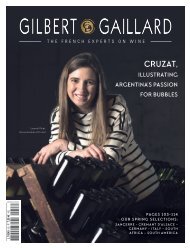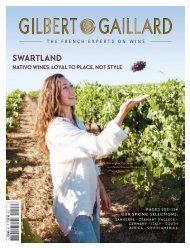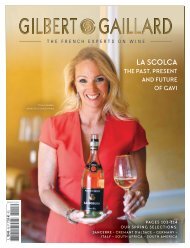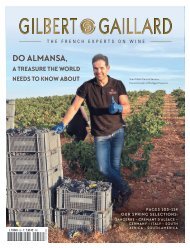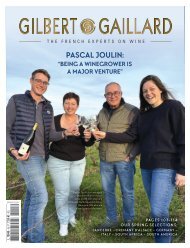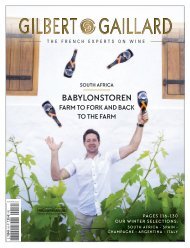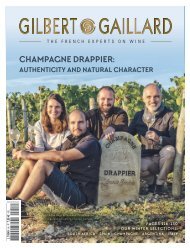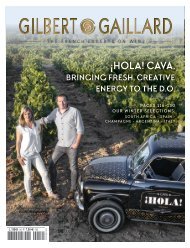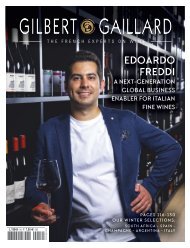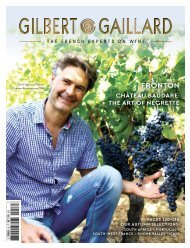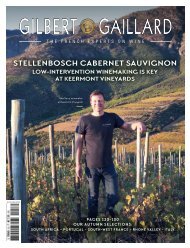You also want an ePaper? Increase the reach of your titles
YUMPU automatically turns print PDFs into web optimized ePapers that Google loves.
SOUTH AFRICA<br />
– PORTRAIT –<br />
Willie Dreyer takes a quick coffee break during the harvest at Leeuwenkuil<br />
Head winemaker Pieter Carstens firmly believes in a<br />
natural approach to winemaking<br />
Highly regarded for the exceptional quality of his grapes,<br />
Dreyer is fully committed to sustainable growing practices,<br />
with one of his vineyards – Langvlei – certified as organic.<br />
“I’m merely a custodian of this land for my children,”<br />
says the proud father of five (Anné, Francisce, Helanzi,<br />
Jonike and Willie Jnr). “Our philosophy is a simple one:<br />
put in the hard work and let nature do the rest. Our<br />
grapes are farmed without herbicides or pesticides, and<br />
left to grow with minimal human interference, allowing<br />
natural expressions of our unique Swartland terroir<br />
to emerge.”<br />
To this day, Leeuwenkuil sells most of its fruit to other<br />
wineries, but in 2008 the Dreyers took the decision to<br />
start making and selling wine themselves. From humble<br />
beginnings, renting cellar space, their winemaking team<br />
led by Pieter Carstens steadily built up a reputation for<br />
crafting intriguing, memorable and ultimately awardwinning<br />
wines. However, their dream was always to have<br />
their own cellar at the farm, and with the 2021 harvest<br />
this has finally become a reality, their methodically<br />
thought-out new winery processing some 15,000 tons.<br />
Where many South African wine producers are facing<br />
tough times, with millions of litres of wine unsold<br />
following the government’s series of bans on local alcohol<br />
consumption during Covid-19 lockdowns, Leeuwenkuil<br />
is in a relatively strong position because most of its wine<br />
is exported. “We feel very fortunate,” says Dreyer.<br />
When asked which Leeuwenkuil wines connoisseurs<br />
should look for, Dreyer answers: “We grow many<br />
varieties, including the biggest block of Pinotage in the<br />
world (49 hectares), but for Leeuwenkuil our focus is<br />
on old-vine Chenin Blanc and Syrah, and blends based<br />
on them. These are the cultivars our region can really<br />
brag about.”<br />
Not that the Dreyers ever brag. Instead, they credit<br />
Carstens, their passionate head winemaker, and the MD<br />
of their cellar, Kobus de Kock, who sometimes has to rein<br />
Carstens in when he gets carried away with new ideas.<br />
“The balance in the team is good.”<br />
They conclude by saying: “Every glass of wine tells a story.<br />
A story of its terroir, of droughts, storms, struggles and<br />
surprises. And we can’t wait to write the next chapter.”<br />
110 SPRING 2021 GILBERT & GAILLARD - THE FRENCH EXPERTS ON WINE



